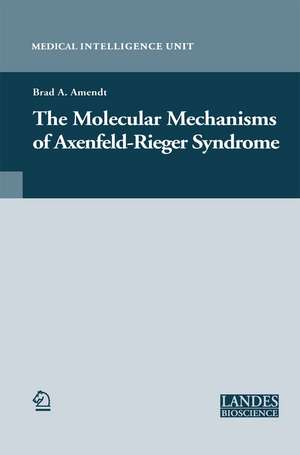The Molecular Mechanisms of Axenfeld-Rieger Syndrome: Medical Intelligence Unit
Editat de Brad A. Amendten Limba Engleză Hardback – 13 iul 2005
| Toate formatele și edițiile | Preț | Express |
|---|---|---|
| Paperback (1) | 706.04 lei 6-8 săpt. | |
| Springer Us – dec 2014 | 706.04 lei 6-8 săpt. | |
| Hardback (1) | 711.72 lei 6-8 săpt. | |
| Springer Us – 13 iul 2005 | 711.72 lei 6-8 săpt. |
Din seria Medical Intelligence Unit
- 5%
 Preț: 367.28 lei
Preț: 367.28 lei - 5%
 Preț: 367.64 lei
Preț: 367.64 lei - 18%
 Preț: 945.79 lei
Preț: 945.79 lei -
 Preț: 392.37 lei
Preț: 392.37 lei - 15%
 Preț: 630.88 lei
Preț: 630.88 lei - 5%
 Preț: 1090.97 lei
Preț: 1090.97 lei - 5%
 Preț: 715.19 lei
Preț: 715.19 lei - 5%
 Preț: 1100.30 lei
Preț: 1100.30 lei - 5%
 Preț: 367.84 lei
Preț: 367.84 lei - 5%
 Preț: 981.72 lei
Preț: 981.72 lei - 5%
 Preț: 1424.31 lei
Preț: 1424.31 lei - 20%
 Preț: 559.21 lei
Preț: 559.21 lei - 5%
 Preț: 1094.97 lei
Preț: 1094.97 lei - 5%
 Preț: 783.04 lei
Preț: 783.04 lei - 18%
 Preț: 942.31 lei
Preț: 942.31 lei - 5%
 Preț: 367.28 lei
Preț: 367.28 lei - 5%
 Preț: 1098.48 lei
Preț: 1098.48 lei - 5%
 Preț: 366.70 lei
Preț: 366.70 lei - 5%
 Preț: 1095.73 lei
Preț: 1095.73 lei - 5%
 Preț: 368.73 lei
Preț: 368.73 lei - 5%
 Preț: 1092.99 lei
Preț: 1092.99 lei - 5%
 Preț: 1093.88 lei
Preț: 1093.88 lei - 5%
 Preț: 1086.58 lei
Preț: 1086.58 lei - 5%
 Preț: 1417.75 lei
Preț: 1417.75 lei - 5%
 Preț: 362.88 lei
Preț: 362.88 lei - 5%
 Preț: 980.68 lei
Preț: 980.68 lei - 5%
 Preț: 715.35 lei
Preț: 715.35 lei - 5%
 Preț: 1092.79 lei
Preț: 1092.79 lei - 5%
 Preț: 365.61 lei
Preț: 365.61 lei - 5%
 Preț: 715.00 lei
Preț: 715.00 lei - 5%
 Preț: 364.53 lei
Preț: 364.53 lei - 5%
 Preț: 1097.18 lei
Preț: 1097.18 lei - 5%
 Preț: 708.58 lei
Preț: 708.58 lei - 5%
 Preț: 1095.54 lei
Preț: 1095.54 lei - 5%
 Preț: 716.28 lei
Preț: 716.28 lei - 15%
 Preț: 644.49 lei
Preț: 644.49 lei - 5%
 Preț: 714.46 lei
Preț: 714.46 lei - 5%
 Preț: 1478.11 lei
Preț: 1478.11 lei - 18%
 Preț: 943.88 lei
Preț: 943.88 lei - 5%
 Preț: 1096.81 lei
Preț: 1096.81 lei -
 Preț: 384.07 lei
Preț: 384.07 lei
Preț: 711.72 lei
Preț vechi: 749.19 lei
-5% Nou
Puncte Express: 1068
Preț estimativ în valută:
136.18€ • 142.20$ • 112.46£
136.18€ • 142.20$ • 112.46£
Carte tipărită la comandă
Livrare economică 15-29 aprilie
Preluare comenzi: 021 569.72.76
Specificații
ISBN-13: 9780387262222
ISBN-10: 0387262229
Pagini: 106
Ilustrații: XII, 106 p.
Dimensiuni: 156 x 234 x 13 mm
Greutate: 0.32 kg
Ediția:2005
Editura: Springer Us
Colecția Springer
Seria Medical Intelligence Unit
Locul publicării:New York, NY, United States
ISBN-10: 0387262229
Pagini: 106
Ilustrații: XII, 106 p.
Dimensiuni: 156 x 234 x 13 mm
Greutate: 0.32 kg
Ediția:2005
Editura: Springer Us
Colecția Springer
Seria Medical Intelligence Unit
Locul publicării:New York, NY, United States
Public țintă
Professional/practitionerCuprins
Identification of the Gene Involved in 4q25-Linked Axenfeld-Rieger Syndrome, PITX2.- Winged Helix/Forkhead Transcription Factors and Rieger Syndrome.- Rieger Syndrome and PAX6 Deletion.- The Molecular and Biochemical Basis of Axenfeld-Rieger Syndrome.- Role of PITX2 in the Pituitary Gland.- Expression and Function of Pitx2 in Chick Heart Looping.- The Multiple Roles of Pitx2 in Heart Development.- The Role of PITX2 in Tooth Development.- PITX Genes and Ocular Development.- An Overview of Axenfeld-Rieger Syndrome and the Anterior Segment Developmental Disorders.
Caracteristici
Presents detailed information and clinical descriptions and diagnosis of ARS, phenotypical descriptions of patients with ARS, Molecular aspects of ARS and gene structure/function studies Describes state-of-the-art scientific methods used to assay genes, gene products and structure/function activities of transcription factors Provides a detailed analysis of specific human mutations Provides both clinical details and descriptions of patients with ARS and functional analysis of the mutant proteins involved













